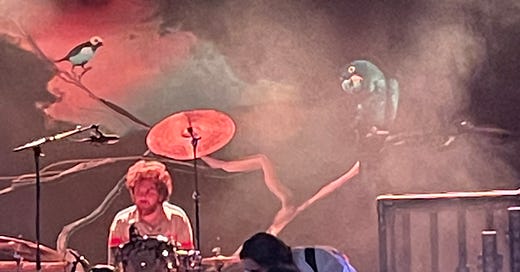Cherry
Welcome back! After a short week of actual fall, New York is back to being in the 70s. This week I got last minute tickets to see Alex G at Brooklyn Steel for the extra Thursday night they added on his God Save the Animals tour. I arrived mid-opener so the room was pretty packed already and my view was not great, but the sound and set list made up for it all! Indie bands can be a hit or miss live, but Alex did not disappoint. They played a very tight set (including the chipmunk voice) and his guitar player, and long time friend, Sam Accione shredded like nothing I was expecting.
Back to the books! This week, I’ll be talking about Cherry by Nico Walker. It’s hard to remind yourself that autofiction is still fiction, but it’s particularly difficult when the character and the author share the same unfortunate fate. Both are US army veterans locked up for a string of drug fueled bank robberies. This book came out in 2018, but I wasn’t too plugged into the publishing scene then and missed any press on it. I’d seen it at many bookstores and after reading Fuccboi, decided it’d be interesting to try another one of Tyrant’s projects. So it wasn’t until I finished the book that I learned it was semiautobiographical and Walker had only written the book (from prison) after Tyrant’s Matthew Johnson, who had learned about him from a Buzzfeed article, reached out and began sending him books to read in prison. Matthew must have been asking himself what everyone else was wondering, “how does a young celebrated army vet from a good family become a serial bank robber?”
**Spoiler Alert** Like Cherry’s main character, Walker found himself at 19 feeling unmotivated and lost, so he dropped out of college and enlists in the army as a medic deployed in Iraq. After two years, he comes home feeling even more purposeless, now riddled with trauma and survivors guilt (and Walker’s case, unsurprisingly, also undiagnosed PTSD). On top of that his girlfriend/wife Emily has left him and he’s back to having nothing to do, so he turns to drugs. Pre-war it was weed, alcohol, and maybe some pills; now it’s pills, cocaine, heroin, and growing weed to fund the habits. Emily comes back in his life and they live solely for the next high. Bank accounts drained, they need to find a way to pay for drugs, their debt growing until he turns to bank robbing.
We never get an explicit reason why our unnamed protagonist decides to enlist. Sure he’s flunking out of college and in a failing relationship, but his family intermittingly provides financial support and he’s recently met Emily who he sees a real future with. Nonetheless, the army recruit is able to convince him to join. Perhaps a stranger believing in him and seeing potential where he felt there was none was all it took. Or maybe the slight guilt of knowing so many of his peers have joined the army and died has affected him more than he lets on.
Once in Iraq, he is confronted with the reality that he is unprepared and their missions are doomed to fail. Not only is the medic training insufficient, but he also lacks supplies, giving out ibuprofen and sending everyone to the hospital, where they may or may not make it. They go on night patrols knocking down doors looking for insurgents. In one incident, a family is home and he stand by as another soldier beats an innocent boy in front of his family. A man is shot and his family runs out unconsolably crying. His unit adopts a stray dog which boosts moral until one day it barks at a female soldier and they order it to be shot. Tragedy, horror, and gruesome violence is all around them. So is the feeling of inadequacy and wondering ‘what are we doing here?’ Most of the time he feels plain stupid.
“People kept dying: in ones and twos, no heroes, no battles. Nothing. We were just the help, glorified scarecrows; just there to look busy, up the road and down the road, expensive as fuck, dumber than shit.”
To put it frankly, he returns even more fucked up than he was before. The following chapters get even grimmer. After what he’s seen in Iraq, he’s apathetic towards life and numbs himself with heroin. I think Walker does a brilliant job of depicting addiction in an honest and upfront way. No sugarcoating and no room for romanticizing. There are moments when he and Emily try to quit, but they are terribly sick and unable to function. After days of feeling like death they finally cave and shoot up. He writes, “And our hearts were beating their wings slowly. We were saved. We felt like angels must feel like.” The drugs destroy them, but also save them. While the book begins with an overdose episode, the drugs end up bringing his demise in a different way. His lifestyle bring around a string of characters involved in dangerous and illicit business and after owing a dealer money, he’s roped into a bank robbery and the rest is history.
While the story itself offers no hope, it’s reassuring to know the book is Walkers’ the redemption. Through writing he found another outlet for his trauma and lived experiences, and was even released from prison early. His next book is allegedly about police brutality.
Thanks for your patience with the schedule changes. Tune in next week for some movie recs and a review of the Door by Magda Szabó





